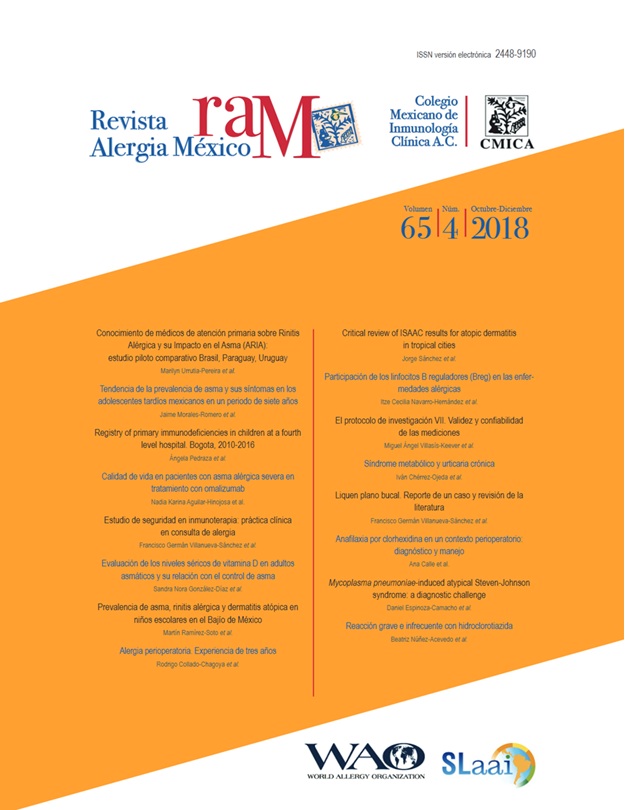Abstract
Background: The immune mechanism involved in the reaction to hydrochlorothiazide, which is widely used to control hypertension, is unknown. The short latency period between the take of the drug and the onset of symptoms suggests immediate hypersensitivity.
Case report: 63-year-old woman with arterial hypertension who, on three occasions, experienced nausea, vomiting, general malaise, shivering, arthralgias, dysthermic sensation, back pain of mechanical characteristics and mild non-productive cough, as well as fever and chest tightness with increased dyspnea and desaturation of up to 88 %, after taking hydrochlorothiazide.
Conclusions: Clinical presentation in the patient was similar to a septic shock, which is a rare allergic reaction. The diagnosis has to be clinical. This type of reaction might be due to type III hypersensitivity owing to the formation of immune complexes. Avoiding of the culprit drug is key to a good evolution.
References
Khan DA, Solensky R. Drug allergy. J Allergy Clin Immunol. 2010;125(Suppl 2):S126-S137. DOI: 10.1016/j.jaci.2009.10.028
Drucker AM, Rosen CF. Drug-induced photosensitivity: culprit drugs, management and prevention. Drug Saf. 2011;34(10):821-837. DOI: 10.2165/11592780-000000000-00000
Pétavy-Catala C, Martin L, Fontès V, Lorette G, Vaillant L. Hydrochlorothiazide-induced acute generalized exanthematous pustulosis. Acta Derm Venereol. 2001;81(3):209.
Li J, Fernando SL. Successful rapid desensitization to hydrochlorothiazide. Ann Allergy Asthma Immunol. 2013;110(4):307-308. DOI: 10.1016/j.anai.2013.01.014
Vereda A, Cárdaba B, Quirce S, De las Heras M, Cuesta J, Sastre J. Immunological studies in a case of hydrochlorothiazide-induced pulmonary edema. J Investig Allergol Clin Immunol. 2005;15(4):297-298. Disponible en: http://www.jiaci.org/issues/vol15issue04/10.pdf
Manso L, Heili S, Fernández-Nieto M, Sastre B, Sastre J. Basophil activation in two cases of hydrochlorothiazide-induced noncardiogenic pulmonary edema. Allergy. 2010;65(1):135-136. DOI: 10.1111/j.1398-9995.2009.02149.x
Corominas M, Andrés-López B, Lleonart R. Severe adverse drug reactions induced by hydrochlorothiazide: a persistent old problem. Ann Allergy Asthma Immunol. Ann Allergy Asthma Immunol. 2016;117(3):334-335. DOI: 10.1016/j.anai.2016.07.003
Naranjo CA, Busto U, Sellers EM, Sandor P, Ruiz I, Roberts EA, et al. A method for estimating the probability of adverse drug reactions. Clin Pharmakos Ther. 1981;30(2):239-245. DOI: 10.1038/clpt.1981.154
Mineo MC, Cheng EY. Severe allergic reaction to hydrochlorothiazide mimicking septic shock. Pharmacotherapy. 2009;29(3):357-361. DOI: 10.1592/phco.29.3.357

This work is licensed under a Creative Commons Attribution-NonCommercial 4.0 International License.
Copyright (c) 2018 Revista Alergia México

